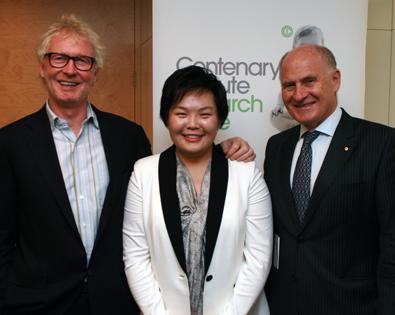The Centenary Institute has recognised one of Australia’s most creative young medical researchers, Dr Connie Wong from Monash University, awarding her the $25,000 Centenary Institute Lawrence Creative Prize to help her develop her ideas on how diet could prevent stroke deaths.
The annual Prize recognises that the most creative medical research is usually done early on in a researchers career - at a time when it’s hardest for them to secure funding. As a nation we should do more to identify and support our best young researchers. We will all be richer for it.
The life-changing and often life-saving results of medical research are becoming increasingly palpable. From the bionic ear to papilloma vaccines, they are part of our everyday lives and, to a degree, now taken for granted. At the inception of some of these advances, they seem like a shot in the dark, looking risky and improbable. However, today our physical health depends on ensuring that discoveries such as these continue, and Australia’s economic wellbeing is much improved when we make and develop these discoveries here.
Dr Wong’s research focuses on using diet to cope with the aftermath of stroke and she thinks we may be able to prevent early deaths following stroke with a fibre-based diet.
Initially Dr Wong used innovative microscope techniques to determine how stroke weakens the immune system. Now she is studying how it also induces leakiness in the gut wall, leading to infection and an upsurge in deaths. And the solution may well lie in diet.
Stroke is the second leading cause of mortality in Australia, resulting in more than 10% of all deaths. Of the survivors, over 60% die within a year or become dependent on others. The cost to the community annually is more than $2 billion.
“Any increase in understanding the mechanisms and consequences of stroke that results in more efficient treatment could have enormous social and economic benefits,” says Dr Wong.
In a post-doctoral fellowship at the University of Calgary in Canada, Dr Wong showed that stroke triggers a release of compounds by the nervous system, seemingly to reduce the level of inflammation in the brain. But this is at the cost of generally weakening the response of the immune system to infection.
In particular, she found that these compounds change the behaviour of the white blood cells known as invariant natural killer T cells. As a result the body becomes increasingly susceptible to infection after a stroke, and that correlates with a subsequent upsurge in deaths from infectious diseases.
Now Dr Wong wants to investigate a linked observation that the gut wall becomes more permeable immediately following a stroke, allowing normally harmless gut bacteria to move into the body where they can initiate infection.
She suspects that the combination of the leakiness of the gut and the reduced ability of the immune system to guard against bacteria, may be the cause of increased vulnerability to infection after a stroke. She now wants to explore if this can be alleviated by an appropriate, fibre-based diet.
This year’s Prize also recognised two other finalists who each received $5,000 towards their research – Dr Anne Abbott also of Monash University and Centenary Institute’s own Dr William (Will) Ritchie.
Dr Abbott, who is transforming the prevention of carotid artery stroke, has shown that a healthy lifestyle and medication are now better than surgery or stenting for preventing stroke in patients with symptomless narrowing of the carotid artery. But that wasn’t enough! She has successfully campaigned to get the international medical establishment to update health policy, guidelines and practice to reflect this.
Dr Ritchie has used statistics to unmask a molecular mechanism that cells use to regulate the levels of individual proteins. Future development of this work could lead to drug therapies for leukaemia, Alzheimer’s disease, cardiac disease and liver cancer. He is now modifying his statistical tool to allow medical laboratories to detect the new mechanism - intron retention - quickly and easily.
A spark of creativity differentiates the inspired from the pedestrian in many fields of work. Clarity in problem analysis and a fresh, distinctive approach are often the keys to success. In the fast-moving marketing world the results of such success are quickly evident. In medical research, in contrast, outcomes are measured in decades and financial benefits, if they ever arrive, are similarly delayed.
Major discoveries are most often made by scientists early in their career, as they acquire their research independence and have the freedom, imagination and energy to produce new ideas and undertake the original experiments that flow from them. Recognising and fanning these sparks early on is critical.
In the hree years of the Centenary Institute Lawrence Creative Prize, with nine finalists and over 30 semi-finalists, we believe it has identified a core of Australia’s creative talent and created an alumni of young medical researchers who are not only aware of current issues but are not afraid to attack tomorrow’s problems.
The Prize has already launched the careers of two talented scientists researching breast cancer and genetics.
I urge you to visit our website to read more about the remarkable work of our three finalists and how this could change our lives in the future.



















__small.png)










